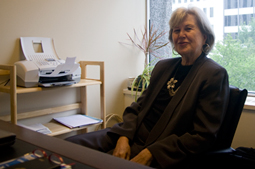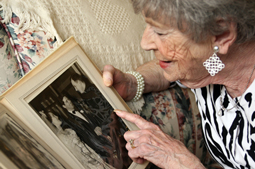Rx for an Aging Nation Retirement Money
World's Oldest Man Keeps It Simple
by Josh Tapper
The Guinness Book of World Records calls Walter Breuning the world’s oldest man. A resident of The Rainbow Senior Living in Great Falls, Montana, for 30 years, Breuning swears by a simple regimen: exercise; eat (but only two meals per day, plus one baby aspirin); work; repeat.
Of course, at 113, Breuning doesn’t work much these days. He performs light, upper-body calisthenics for 10 minutes each morning, listens to radio news (his deteriorating eyesight prevents him from reading), entertains a continuous stream of visitors and retires by 8 p.m. Despite some wear and tear, Breuning, who uses a walker, has a clean bill of health.
“The way I feel, I’ll be here a long time yet,” he says.
Breuning maintains an unequivocally rosy outlook on life. While many adults dread old age, Breuning thinks 19- to 25-year-olds are the most troubled; after that, each year marks an improvement.
He began his 50-year career with the Great Northern Railway as a teenager, in 1913. He enlisted for military service during World War I but was never called for duty. By the time World War II flared, he was too old to serve. His wife of 35 years died in 1957.
Last year, researchers from Boston University visited Breuning, extracting blood for a study on genetic markers of long life, published in the journal Science. Breuning told them they weren’t going to find anything revelatory.
His own prescription for healthy aging is following a daily routine. And death doesn’t require a second thought.
“You’re born to die,” he says. “Everybody should know that. There’s nothing to be afraid of.”
-

Wisdom Begins at the EndA spate of recent research supports one of humanity’s most venerable claims: wisdom comes with old age. Studies identify emotional and cognitive abilities that increase among seniors, including an enhanced ability to resolve conflict and tolerate uncertainty.

What We Lose as We AgeThe common narrative of aging is loss. A complex cycle of psychological and emotional challenges—social isolation, widowhood, and depression, in particular—can converge to alter the ways older Americans experience their final decades.
THIS PACKAGE IN DEPTH
To read about how this story came together and the reporters involved
Click Here.
To see this story as published on Washingtonpost.com Click Here